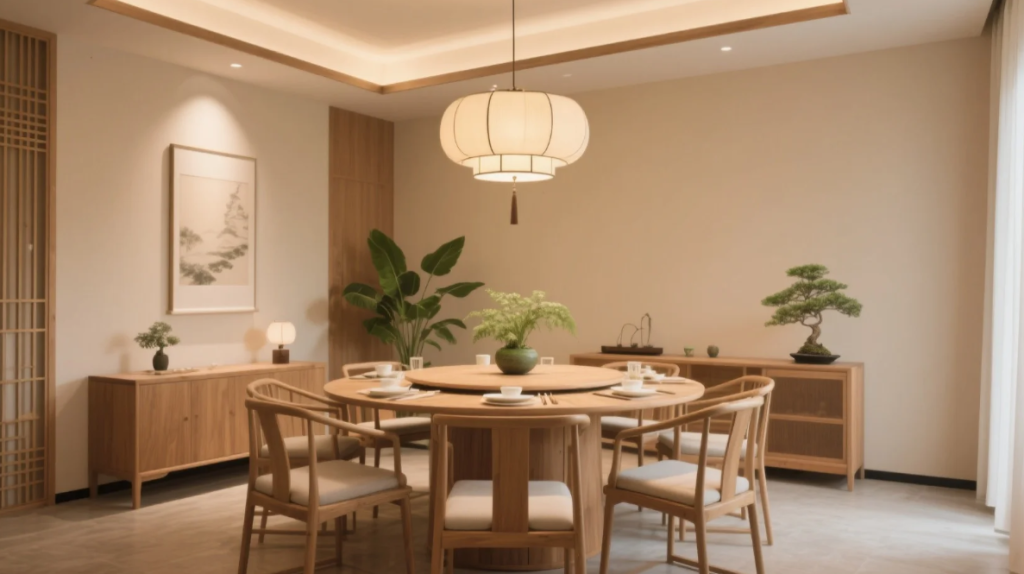Why Is Feng Shui Important for Your Dining Room?
Have you ever thought about how your dining room affects your mood and relationships? The way this space is arranged can influence more than just mealtime comfort. In Feng Shui, the dining room is a place where energy gathers—energy that affects family harmony and abundance.

When you apply dining room feng shui, you’re not just organizing furniture. You’re encouraging positive energy flow. This energy helps people feel connected and nourished, which actually improves digestion and conversation.
How Can You Arrange Your Dining Table for Good Energy?
The dining table is the heart of the room. But not all tables create the same energy. So, what’s the best shape and placement?
- Round or oval tables invite conversation and equality. Everyone feels included.
- Rectangular tables are fine but avoid sharp corners pointing at people. This can cause tension.
- Position the table away from doors, but keep it visible from the entrance. This gives a sense of safety.
- Avoid placing the table under heavy beams or directly beneath a ceiling fan to prevent energy disruption.
A family in Chicago found that switching from a square table to a round one eased arguments during dinner. That simple change improved their mood and harmony.
What Colors and Decorations Support Dining Room Feng Shui?
Colors carry strong emotional energy. For dining rooms, warm and earthy tones like soft reds, oranges, and browns work well. They stimulate appetite and invite warmth.
However, too much red can create excitement that’s hard to calm down after the meal. Balance is key.
Decorations such as fresh flowers or a bowl of fruit symbolize growth and abundance. Mirrors can be tricky—they should reflect the table to double energy, but not reflect the door, which may push energy away.
Interestingly, using natural materials like wood and ceramics connects you to the earth element, grounding the room’s energy.
How Does Lighting Affect the Energy in Your Dining Room?
Lighting plays a huge role in Feng Shui. Harsh or flickering lights create chaotic energy. Soft, warm lighting invites relaxation and togetherness.
Try a dimmable chandelier or pendant light centered over the dining table. This focuses energy and makes the space feel cozy.
If you have windows, maximize natural light during the day. Sunlight brings yang energy, which balances the yin energy of evening meals.
A couple in New York installed a warm, adjustable pendant lamp. They noticed better conversations and more enjoyable dinners.
What Should You Avoid in Dining Room Feng Shui?
Avoid clutter or heavy items that block energy flow. Clutter causes stagnation and stress.
Sharp corners on furniture, especially pointing toward seats, should be softened with rounded edges or tablecloths.
Also, stay away from dark or cold colors like black or gray in large amounts—they can make the space feel uninviting.
It’s also best to avoid having the dining room directly aligned with the front door. This alignment can cause energy to rush past the room too quickly, disrupting calm.
Can Dining Room Feng Shui Improve Wealth and Health?
Absolutely. The dining room is where food—and therefore nourishment—enters the home. Good energy here supports digestion, health, and even wealth.
For example, placing a healthy plant or a water feature nearby encourages growth and flow. Using fresh, bright table settings shows respect for food and abundance.
However, Feng Shui isn’t magic. It works best when combined with genuine care and attention.
Real-Life Tips to Enhance Dining Room Feng Shui
- Keep the table clear except for meaningful decor.
- Use a table runner or cloth in warm colors.
- Display family photos or art that evoke happiness.
- Add plants like bamboo or money plants to bring vitality.
- Avoid mirrors that reflect clutter or the entrance.
One family in Los Angeles saw their family bonds strengthen just by placing a bowl of oranges and fresh flowers on the table. Small changes can have a big impact.
What If Your Dining Room Is Near the Front Entrance?
This can be tricky. A dining room close to the front door might feel exposed or drafty, making energy unstable.
If this is your situation, consider using a partition or screen to block direct energy flow. Soft curtains or plants can also act as buffers.
Use rugs to define the dining area and ground the space.
Interestingly, a home in Seattle used a folding screen between their front door and dining table. This simple fix helped improve calmness during meals.
Frequently Asked Questions
What is the best shape for a feng shui dining table?
Round or oval tables promote equality and better conversation. Avoid sharp corners pointing at diners.
Is it okay to have the dining room near the front entrance in feng shui?
It’s not ideal because energy may rush through. Use partitions or plants to soften the flow and create a cozy atmosphere.
How can lighting improve dining room feng shui?
Soft, warm lighting centered over the table enhances relaxation and connection. Natural light during the day balances the energy.
What colors work best in dining room feng shui?
Warm earth tones like soft reds, oranges, and browns encourage appetite and warmth but should be balanced to avoid overstimulation.
Can feng shui really impact health and wealth through the dining room?
Yes, because the dining room supports nourishment and abundance. Positive energy flow here promotes overall wellbeing and prosperity.
